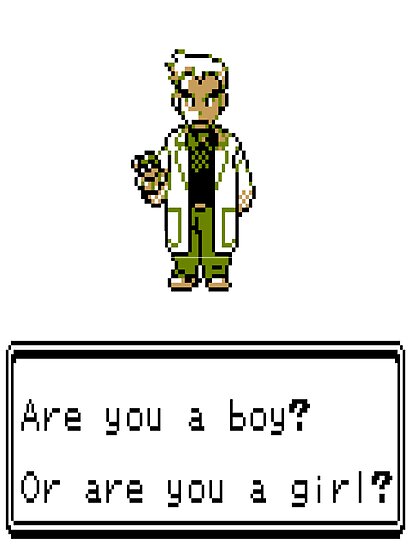Unlike Kate Bornstein, when I was thirteen years old I was calmly asked. "Are you a boy? Or are you a girl?" for the first time in my life. And it was to be the first of many times.
The person asking me this was the famous Pokemon Professor, Oak. The screen had gone silent, and the shivers ran up and down my spine. For the first time I was able to choose the gender to which I subscribed, if not by clear choice, by circumstance. When I was thirteen, I traded away my copy of Pokemon Silver along with some choice trading cards for a copy of Pokemon Crystal. I wasn't upgrading to a new model, but rather the trade was motivated by virtue that it was the first Pokemon game to have a playable female protagonist: Kris.
In theory, the gender choice is extremely superfluous in the Pokemon series; passersby say the same things to you, and the world continues in the exact same way as if you were a boy. The in-game mother seems no more anxious about her ten year old daughter setting off into the world, than her ten year old son. Kris is a fairly gender-less tomboy. The different generations of Pokemon games have since presented a range of characterisations of its women: the girls encountered on the road are cool and suave team rockets, or ditzy lasses. Equally. The female protagonists equally range from boyish, to adorable and kooky.
 |
| The "girl" edition never had an english translation. |
On the surface Kris in Pokemon Crystal plays exactly the same as any male character and dresses fairly similarly; in sensible shorts. But on a personal level, I was thrilled. On screen, was not "Matt", the boy that had gotten me through Pokemon Blue, and Silver and Harvest Moon: Back to Nature. I had played the heck out of those games. Playing Harvest Moon a farming and dating simulator was the happiest hundred hours of my teenage years. But "Matt" was never me; only the character I was pretending to be. Unlike her male counterparts, Kris, was a blank canvas onto which I painted myself. The game was a platform to negotiate my own identity. A chance to really address the first question Pokemon Crystal asked: Was I a boy or a girl?
These days, I often make the choice based on calculations that extend beyond a personal desire to play as a woman. In Bethesda's Fallout 3 there is an infamous "Black Widow" perk, which gives females an advantage over the opposite sex, in a world populated by male enemies. This "game favoured gender" is a useful strategy for gaming developers when it is used to give the gender choice meaning and depth. It is less helpful when it reinforces male physical prowess, or female "healing" proficiency. As games continue to develop, it is possible that gender choice will become ever more nuanced decision, creating difference in game narratives and play styles.
 |
| Take that! Patriarchy! |
In the second part I will examine what happens when video games are conscious of gender narratives. I will examine two fascinating freeware games by transgender women:
Mainichi, by Mattie Bruce
and Dys4ia.
Each of these games explore both the internal struggle, and makes explicit the problems faced once outsiders are given the opportunity to engage in gender narratives, and are worth the ten minutes they take to play.


No comments:
Post a Comment